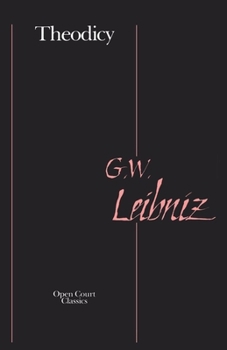Essais de Théodicée sur la bonté de Dieu, la liberté de l'homme et l'origine du mal
Select Format
Select Condition 
Book Overview
In order to be truly free, must you act arbitrarily? If an event did not happen, could it have happened? Since there is evil, and God could have made the world without evil, did God fail to pick the best course? Grappling with such simple--yet still intriguing--puzzles, Leibniz was able to present attractively his new theories of the real and the phenomenal, freewill and determinism, and the relation between minds and bodies. Theodicy was Leibniz's only book-length work to be published in his lifetime, and for many years the work by which he was known to the world. Fully at home with the latest scienctific advances, Leibniz ultimately rejected the new atomistic philosophies of Descartes, Gassendi, and Hobbes, and drew upon the old cosmology of Aristotelian scholasticism. There could be no conflict, he argued between faith and reason, freedom and necessity, natural and divine law. Ingeniously defending his postulate of pre-established harmony, Leibniz made important advances in the precise analysis of concepts.
Format:Paperback
Language:English
ISBN:0875484379
ISBN13:9780875484372
Release Date:December 1998
Publisher:Open Court
Length:448 Pages
Weight:1.33 lbs.
Dimensions:1.1" x 5.6" x 8.5"
Customer Reviews
3 ratings
Excellent, but with caveat
Published by Thriftbooks.com User , 17 years ago
I have nothing to add to the previous reviews concerning the importance of Leibniz's thought as expressed in this book. I would like to add this caveat, however: this translation is not a critical edition. Leibniz quotes numerous passages in Greek and Latin (he was enormously erudite), but these passages are not translated in this edition. Neither does the editor/translator identify where the quoted passages are from (this would be useful if one wanted to look up the original context of a passage that Leibniz is quoting). Fortunately, the quotations are usually not necessary to understand the argument, which is somewhat repetitive in any case. The other disadvantage of this volume is that the index contains only proper names and not ideas. This is unfortunate, since much of the work is not clearly organized and the discussion of a given issue is often scattered throughout the book. But since this is the best edition of the Theodicy currently available in English, one has to live with these disadvantages.
This is the motherload!
Published by Thriftbooks.com User , 19 years ago
This, and other of Leibniz's writings are, ..... I don't know. Profound? That is an understatement! Paradigm shifting? At least a few? These are some of the most powerful and poignant thoughts put into writing. This is the man who discovered the calculus with meaning (as opposed to Newton, who also gets credit, but had a different basis). Leibniz gets some bad neglect in history, largely because Voltaire undermined his thoughts by creating a ridiculous straw-man of Leibniz's ideas - maybe Voltaire just couldn't grasp it! It is some of the hardest writing to read, especially since there was nothing before this like it. (for this reason, I recommend, if new to Leibniz, to NOT read an introduction or such. Many "scholars" still give Voltaire's slant on Leibniz. Read for yourself and then judge). For hundreds of years Leibniz was put on the back shelf because Newton reigned supreme. But guess what? It turns out that Leibniz was right in his charges against Newton. The death of classical physics and the rise of the quantum started with Leibniz - it just took the world a while to catch up. Also, if you have to deal with someone who gives that trite argument "If God is all powerful, If God is all good, How is there evil in the world," Plop, this book on his/her lap. Why people expect and easy and quick answer to this question is beyond me. Leibniz's answer, his treatment of free will and determinism, the soul and the individual - truly, if grasped, will change some part of your mind for the better.
Light years ahead of its time
Published by Thriftbooks.com User , 22 years ago
_Theodicy_ by Leibniz is amazingly relevant and readable considering how long ago it was written. This book is far better than many other works of philosophy which came much later. Very few authors have been able to tackle the problem of the relationship between the existence of evil and the existence of God with as much skill and clarity as Leibniz. The issues discussed in this book are still very relevant today, and the questions concerning evil and the existence of God still have not been answered. That is what makes this work so timeless; if I had been told that it was written yesterday I would have believed it, so relevant are the questions and so readable is the style. This is a must-read for even the most modern and scientifically-minded philosophers. Leibniz adresses questions that are completely independent of science, and can never be answered through science alone. The only way to solve the ancient problem of evil is to continue to think about it in the same way as Leibniz, even though we may never find a solid answer.





